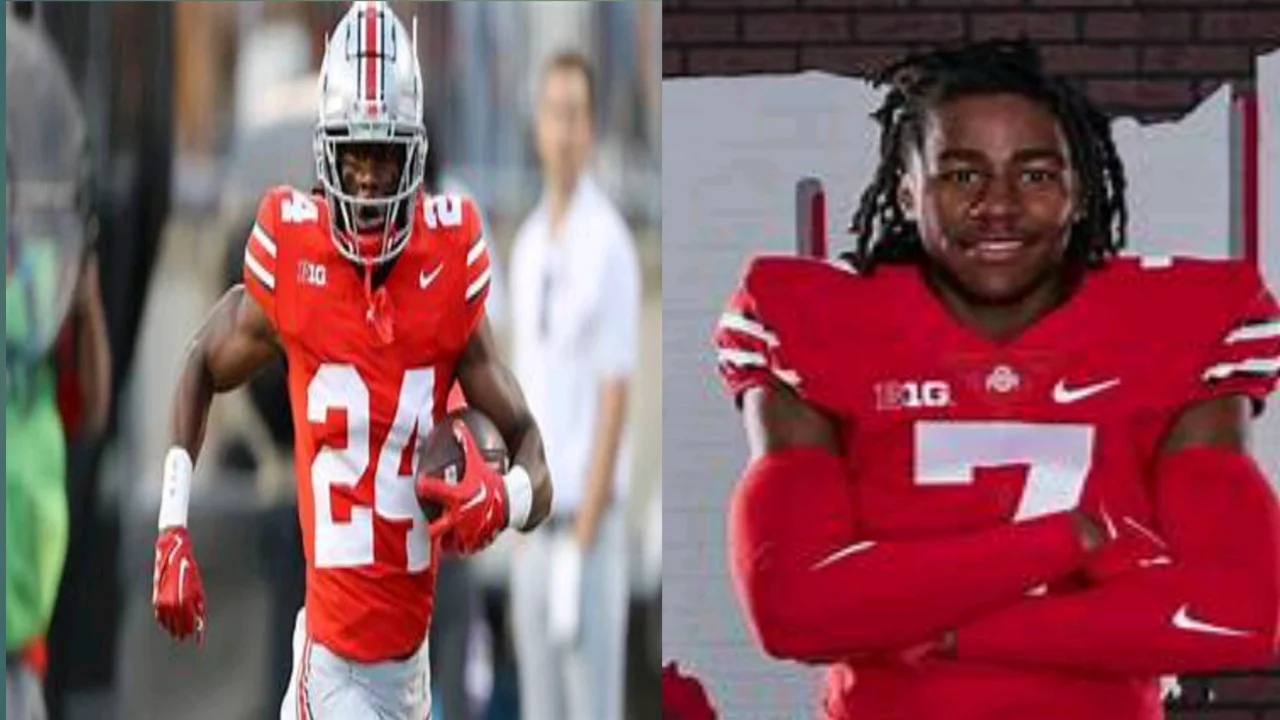In a move that resonates deeply with personal significance and Ohio State football tradition, cornerback Jermaine Mathews Jr. has officially announced his decision to change his jersey number from 24 to 7 for the upcoming 2025 season. This change not only reflects Mathews’ personal journey and aspirations but also aligns him with a lineage of Buckeye greats who have donned the esteemed number 7.
A Return to Roots: The Significance of Number 7
For Mathews, the number 7 is more than just a numeral; it’s a symbol of his football origins and personal identity. During his high school career at Winton Woods High School in Cincinnati, Ohio, Mathews wore the number 7 jersey, establishing himself as a formidable player in the state’s high school football scene. His performance garnered significant attention, leading him to commit to Ohio State University. Upon joining the Buckeyes in 2023, the number 7 jersey was occupied by fellow cornerback Jordan Hancock, prompting Mathews to adopt number 24 for his freshman and sophomore seasons. With Hancock’s transition to the NFL, the number 7 became available, allowing Mathews to reclaim a number that holds personal significance.
High School Excellence at Winton Woods
Mathews’ tenure at Winton Woods High School was marked by exceptional performances that solidified his reputation as one of Ohio’s premier defensive talents. In his senior year, he recorded 51 tackles and six interceptions, three of which he returned for touchdowns. His leadership and on-field prowess were instrumental in leading the Warriors to an undefeated 9-0 regular season, positioning them as strong contenders for the Ohio Division II state title. These accomplishments not only showcased his athleticism but also his ability to influence the game’s outcome significantly.
Transition to Ohio State: Early Challenges and Triumphs
Upon enrolling at Ohio State in January 2023, Mathews faced the typical challenges of adapting to the heightened competition and rigorous demands of college football. Despite these challenges, he quickly distinguished himself during spring drills, earning playing time as a true freshman. His adaptability and resilience were evident as he transitioned from high school to collegiate-level play, demonstrating a maturity beyond his years. His freshman season culminated in recognition as a Freshman All-American, a testament to his immediate impact on the field.
Sophomore Season: Building on a Strong Foundation
In his sophomore year, Mathews continued to develop his skills and contribute significantly to the Buckeyes’ defense. He participated in 14 games, amassing 22 tackles, including 14 solo efforts, and recording 2.5 tackles for loss with one sack. His consistent performance and growing confidence on the field underscored his importance to the team’s defensive strategies. As he gained more experience, his understanding of the game deepened, allowing him to anticipate plays and make decisive actions that thwarted opposing offenses.
The Legacy of Number 7 at Ohio State
The number 7 jersey at Ohio State carries a storied legacy, having been worn by several illustrious players who have made significant contributions to the program:
-
Chris Gamble: A versatile player known for his dual roles on offense and defense, Gamble’s athleticism and playmaking abilities made him a standout during his tenure.
-
Ted Ginn Jr.: Renowned for his exceptional speed and agility, Ginn Jr. was a dynamic wide receiver and return specialist, leaving an indelible mark with his electrifying plays.
-
Joey Galloway: A prolific wide receiver, Galloway’s combination of speed and reliable hands made him a formidable threat to defenses and a key player for the Buckeyes.
-
Dwayne Haskins: As a quarterback, Haskins set multiple records during his time at Ohio State, showcasing his passing prowess and leadership on the field.
By choosing to wear number 7, Mathews aligns himself with this lineage of exceptional athletes, embracing the responsibility and expectations that come with it.
Looking Ahead: Mathews’ Aspirations for the 2025 Season
As Mathews embarks on his junior year, the decision to switch to number 7 signifies more than a change in attire; it represents his growth, ambition, and readiness to elevate his game further. With two seasons of collegiate experience, he is poised to take on a leadership role within the Buckeyes’ defense. His journey from a high school standout to a key player at Ohio State exemplifies his dedication and passion for the sport. Fans and analysts alike anticipate that wearing number 7 will inspire Mathews to reach new heights, contributing to the team’s success and honoring the legacy associated with the jersey.
Jermaine Mathews Jr.’s decision to don the number 7 jersey for the 2025 season is a testament to his personal journey, the rich traditions of Ohio State football, and his commitment to excellence. As he steps onto the field with this iconic number, he carries forward a legacy of greatness, poised to make his mark and inspire future generations of Buckeyes.
Support for Christman’s Family and Teammates
In the wake of Ben Christman’s tragic passing, a groundswell of support has emerged for his family and former teammates. A GoFundMe campaign, initiated by close friends of the Christman family, has been set up to assist with funeral expenses and provide financial support during this difficult time. Within hours of its launch, the fundraiser received thousands of dollars in donations, with contributions pouring in from current and former teammates, fans, and members of the broader college football community.
Beyond financial support, mental health professionals and grief counselors have been made available to UNLV players and coaching staff, recognizing the emotional toll that losing a teammate can have on young athletes. The university has extended these services to members of Kentucky and Ohio State football programs as well, ensuring that those who played alongside Christman have the resources to cope with their grief.
Dr. James Whitmore, a sports psychologist working with UNLV Athletics, emphasized the importance of processing loss in a healthy way. “The death of a teammate is more than just losing a player on the field—it’s losing a brother, a family member. Many of these young men have never experienced loss of this magnitude, and we want to ensure they have the support they need.”
Teammates have shared that the locker room atmosphere at UNLV has been somber but unified in honoring Christman’s memory. Several players have taken it upon themselves to organize weekly team meetings dedicated to sharing stories about Christman and supporting one another through their grief.
A Reflection on Christman’s Character
Beyond his physical talents and contributions on the field, those who knew Christman best continue to highlight his integrity, leadership, and infectious positivity. One of his former high school coaches, Mike Murphey, recalled, “Ben wasn’t just the biggest guy on the field—he had the biggest heart, too. He made everyone around him better, whether that was through his play or just the way he carried himself every day.”
His kindness extended beyond football. Several of his former classmates shared stories of Christman helping younger players with schoolwork, volunteering at local charity events, and making time for anyone who needed a friend. Even in the highly competitive environment of college football, Christman was known for his humility, always prioritizing the team over individual success.
“Ben never sought attention for himself,” said former Ohio State offensive line coach Greg Studrawa. “He put in the work, helped his teammates, and always had a positive attitude. He was the kind of player every coach wants on their team.”
University of Kentucky athletic director Mitch Barnhart echoed those sentiments, saying, “Ben exemplified what it means to be a student-athlete. His hard work, dedication, and sportsmanship made a lasting impression on our program, and he will always be a part of the Wildcat family.”
Looking Toward the Future
Even as the football world mourns, there is an undeniable sense that Christman’s legacy will continue to shape the game. His death has already sparked conversations about the importance of athlete health monitoring and the need for more rigorous medical screenings at the collegiate level. Athletic departments across the country are discussing potential changes to their health and safety protocols, with the goal of preventing similar tragedies in the future.
The NCAA has acknowledged these discussions, with some officials advocating for increased cardiac screenings and mandatory annual EKGs for student-athletes. If implemented, such changes could help identify at-risk individuals early and provide preventative care before a potential medical emergency arises.
Christman’s impact is also evident in the way his former teams are rallying together to honor his memory. Plans are in motion to establish a permanent scholarship in his name at UNLV, aimed at supporting offensive linemen who exemplify his dedication and leadership. Kentucky and Ohio State are also considering ways to recognize his contributions, whether through jersey patches, moment-of-silence tributes, or commemorative plaques in their respective facilities.



